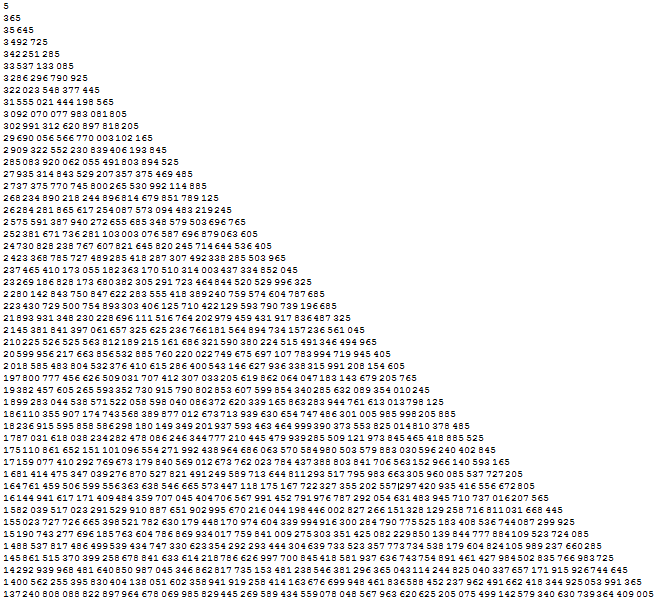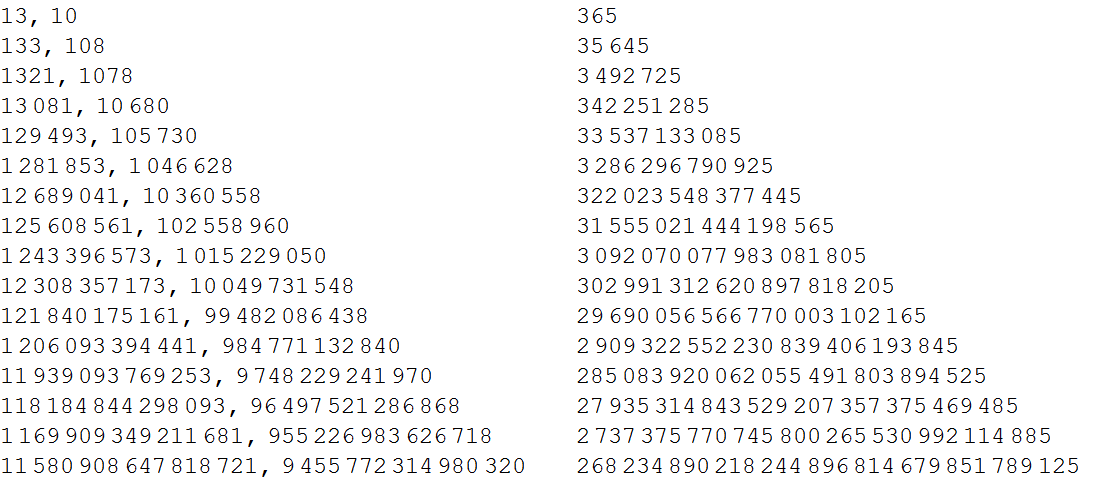I'm surprised no one bothered to pursue the method given in Simons and Alder's paper, as commented by KConrad. A Mathematica implementation of their idea is surprisingly short:
n = 10;
MapThread[With[{z = (#1 + 1)/2}, 3 #2 + 2 z - 2 + {z, 0}] &,
LinearRecurrence[{10, -1}, #, {1, n} + 1] & /@ {{1, 5}, {0, 2}}]
{{13, 10}, {133, 108}, {1321, 1078}, {13081, 10680}, {129493, 105730},
{1281853, 1046628}, {12689041, 10360558}, {125608561, 102558960},
{1243396573, 1015229050}, {12308357173, 10049731548}}
2 (# + 1) # + 1 & /@ %[[All, 1]]
{365, 35645, 3492725, 342251285, 33537133085, 3286296790925, 322023548377445,
31555021444198565, 3092070077983081805, 302991312620897818205}
As mentioned, the problem can be reduced to solving a certain Pell equation. I used LinearRecurrence[] to generate the Pell solutions, after which they are transformed to the first terms of the sum of consecutive squares. To check, say, the second term of the sequence:
133^2 + 134^2 == 108^2 + 109^2 + 110^2 == 35645
True
I recommend reading that fascinating paper if you can.
Not being contented with what I've written above, I've decided to write a full Mathematica implementation of the Simons and Alder method. The function consecutiveSquareSum[n, k], given below, will list the first k triples consisting of the first term of the sums of n and n + 1 consecutive squares, and the sum itself:
SquarefreePart[n_Integer?Positive] :=
Times @@ Power @@@ MapAt[Mod[#, 2] &, FactorInteger[n], {All, 2}]
(* generate k solutions to the Diophantine equation x^2 - n y^2 == 1 *)
pellSolutions[n_Integer, k_Integer?Positive] := Module[{p, q, r, u, v},
r = Length[Last[ContinuedFraction[Sqrt[n]]]];
If[OddQ[r], r *= 2];
{p, q} =
Through[{Numerator, Denominator}[Last[Convergents[Sqrt[n], r]]]];
{u, v} = {2 p, n q^2 - p^2};
Transpose[LinearRecurrence[{u, v}, #, {2, k + 1}] & /@
{{1, p}, {0, q}}]]
consecutiveSquareSum[n_Integer?Positive, k_Integer?Positive] :=
Module[{a, a2b, b, cQ, d}, cQ = MatchQ[Mod[n, 4], 1 | 2];
a2b = If[cQ, n (n + 1)/2, n (n + 1)/4];
b = SquarefreePart[a2b]; a = Sqrt[a2b/b]; d = If[cQ, 2 b, b];
Block[{z = (#1 + 1)/2, y}, y = a b #2 + n (z - 1);
{y + z, y, ((n/3 + 1/2) n + 1/6) n + y (y + n) (n + 1)}] & @@@
pellSolutions[d, k]]
As an example, generate the first five sums of $100$ and $101$ consecutive squares:
consecutiveSquareSum[100, 5]
{{20201, 20100, 41008358350}, {8140601, 8100200, 6627019056398350},
{3272521201, 3256280300, 1070939533497408458350},
{1315545402001, 1309016600400, 173065970485621168960538350},
{528845979103001, 526221417100500, 27967806961346412612849840638350}}
Taking the first triple as an example, this says that $20201^2 + \cdots + 20300^2 = 20100^2 + \cdots + 20200^2 = 41008358350$.




